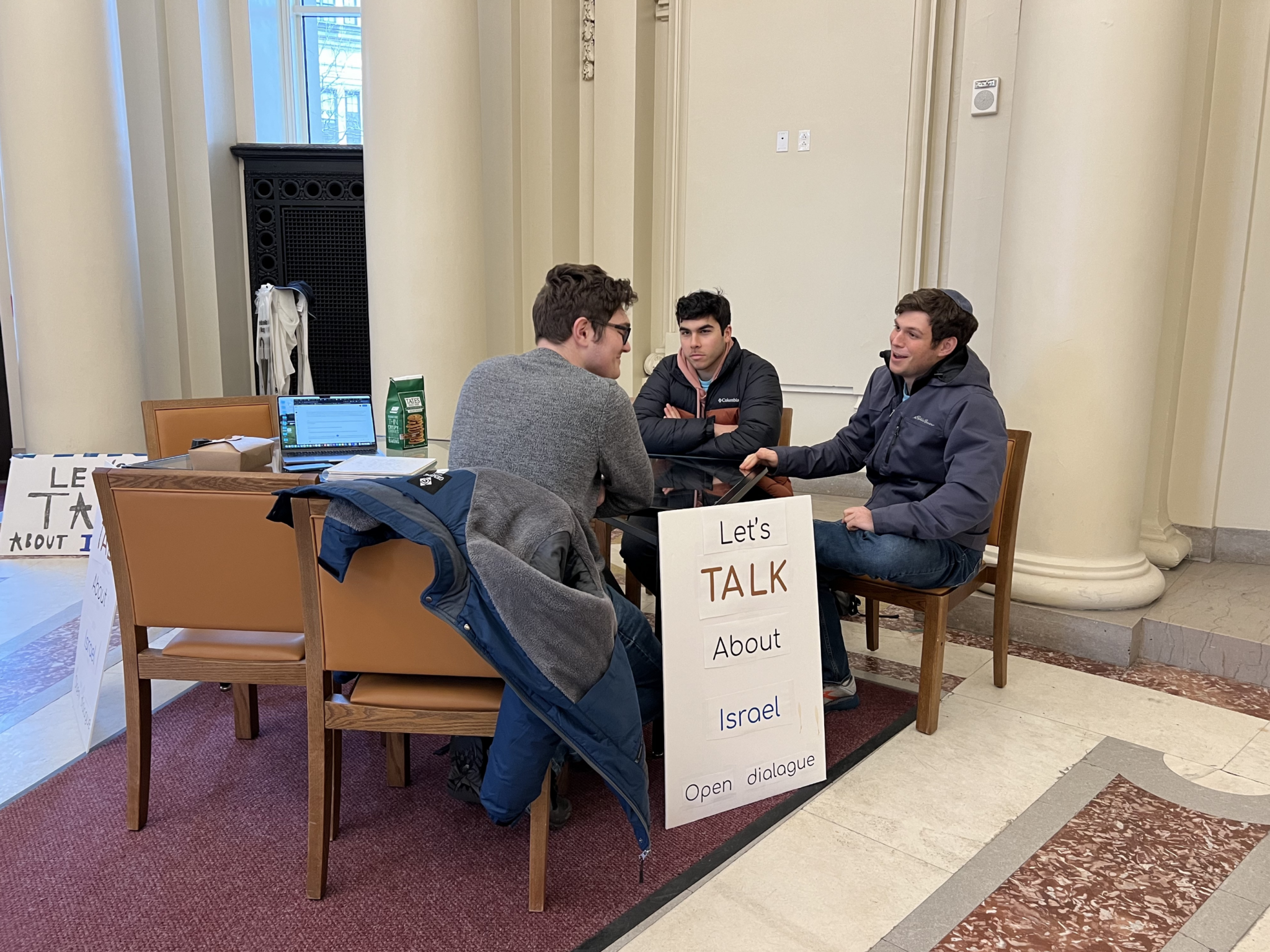Students organize ‘Let’s Talk About Israel’ table
In the fall, students organized a “Let’s Talk About Israel” table on Cross Campus. This semester, the table has moved to the rotunda of the Schwarzman Center, with the goal of engaging Yalies in conversation about Israel’s ongoing war in Gaza against Hamas.

Chris Tillen, Contributing Photographer
Once a week, Jewish pro-Israel students have spent the lunchtime hours awaiting dialogue at a table labeled “Let’s Talk About Israel” in the rotunda of the Schwarzman Center.
Started by Eytan Israel ’26, the “Let’s talk about Israel” discussion table debuted the week before reading period in the fall semester. In the fall, students staffed the table on Cross Campus for four hours a day, Monday through Friday, until the beginning of reading period.
So far, the table has returned twice – from 11 a.m. to 3 p.m. on Wednesday, Jan. 31 and Tuesday, Feb. 6 – in the rotunda of Schwarzman Center, now in association with the organization Yale Friends of Israel after being unaffiliated in the fall.
“Throughout all of this stress, the leaders of this table continue because we feel a duty. A duty to defend the only Jewish country in the world,” wrote Israel.
In the fall, the table saw roughly 20 people per day and it has seen 10 to 15 people per day during this spring semester, per Israel. Israel said that going forward, the table will hopefully meet once a week for the hours around lunchtime.
Israel said that he thought of organizing the table amid campus tensions in the aftermath of the Oct. 7 surprise attack that Hamas launched against the state of Israel, after a conversation with a friend at the University of Pennsylvania who had created a similar dialogue table.
In the Oct. 7 attack, Hamas killed 1,200 people. The state of Israel responded with a formal declaration of war against Hamas and a full-scale military assault in Gaza. As of Feb. 9, Israeli attacks have killed at least 27,800 Palestinians in Gaza.
There have been protests at Yale and around the country in support of Palestine, including one in New Haven on Feb. 7 that halted the mayor’s annual State of the City address to call for a ceasefire.
Amid these tensions, Israel — the student — said that he felt there was little dialogue around these ideas on campus, adding that he felt students who wanted to partake in civil discourse had no place to do so.
Ami Listokin ’27, a staffer at the table on Wednesday, said that a goal of the table was to “realize the humanness” of people on all sides of the issue.
“A lot of this conversation on both sides sort of becomes people talking past one another,” Listokin said.
For Israel, hearing phrases such as “resistance is justified if the land is occupied” from people he considered his peers and friends has felt like “legitimization of the murder of innocent Jews,” which Israel said “completely shocked and upset” him.
He emphasized that the goal of the table isn’t to promote a certain viewpoint or change the ideologies of other Yale community members. Instead, the table strives to encourage the respectful exchange of ideas in conversations.
“Civil discourse is under threat on this campus,” Abe Baker-Butler ’25, a staffer at the table, wrote to the News. “The point of this table is to move beyond slogans and assumptions and to empower people to think, discuss, and ask questions openly and with nuance and reason about Israel.”
According to Israel, people who approach the table have ranged from students with little background on the issue to those who are actively critical of the state of Israel or even opposed to its existence.
Sabrina Zbar ’26, a student fielding questions at the table, said that she didn’t feel there was another space on campus where people could ask questions and discuss in a “face-to-face” manner.
“We really want anyone to feel like they’re comfortable sitting and engaging with us,” said Zbar, adding that she feels the table is an opportunity for students to approach this conversation “on their own terms.”
Israel said that within the group of students staffing, there are no requirements for their views on Israel or Zionism.
“One of the important things that we’re trying to show here is that just because you have this label of believing in some sort of Jewish state doesn’t mean we all have the same opinion,” said Listokin.
Israel himself defined Zionism as supporting the “rights and needs for Jews to have a homeland where they could be autonomous and have security in their historical land.”
While the News was at the table on Feb. 6, two students sat down to talk who were interested in discussing the conflict as an open dialogue and understanding the religious context.
Israel recounted one conversation that he had at the table on that day, in which he said a Muslim student stopped by and shared that most of what they had been seeing on social media was anti-Israel and that they were curious to hear what pro-Israel students were thinking and feeling.
The Schwarzman Center opened its doors on Sept. 1, 2021.







